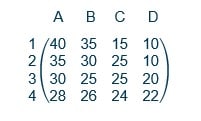A sideways look at economics
In September, I’ll be moving into a shared house in Bath with three of my mates. We won’t be the first to get into a debate about how to split the rent, particularly when, as in our case, the rooms are all different. Two rooms have ensuites, while the other two share a bathroom, one of which is on a different floor to the bathroom. It just doesn’t seem fair to split the rent equally between us. This led me to think: is there a way to split it that is objectively fair?
Perhaps you’re wondering what cake has to do with this but, in fact, cake has more in common with a shared house than you might think (stick with me here). It turns out that cake-cutting and fair division is a substantial field of academia, sitting at the intersection of economics, maths, and computer science. Imagine, as our boss Erik did in a previous TFiF, that you are dividing cake between yourself and a friend. In theory,[1] is there an objectively fair way to do this? Assuming you’d both like as much cake as possible, a good way is the ‘divide and choose’ method. Here, one of you will cut the cake, and the other will pick the slice they want. Therefore the ‘cutter’ is incentivised to split the cake as evenly as possible, knowing that the friend will choose the larger piece.
For a shared house with two people, this method works quite well. One person decides how to split the rent and the other gets to pick the room they want. In a simple case, person one sees the two rooms, and prices them at £60 and £40 respectively in rent, although in reality, you’d be lucky to get a cupboard for this price in Bath! Person two then chooses room A at £60 or room B at £40. Person one is incentivised to split the rent in such a way that they like the two combinations {RoomA, PriceA} and {RoomB ,PriceB} equally.
Using this method, neither person can be made better off without making the other worse off. This is Pareto efficiency. However, while person two is choosing the room they want, they are thinking about how they would have split the rent. There are four possible cases:
- Person two would have split the rent in exactly the same way, in which case they’d choose one room at random as they are indifferent between them
- Person two would have split the rooms more evenly, e.g., £55 and £45, in which case they would choose room B at £40, as it is less than the price at which they would have accepted it (£45)
- Person two had a stronger preference for room A than person one, e.g., they would have priced it £70 and £30. Therefore they will choose room A, since the price that person one attached to it is less than they would have paid for it
- Person two actually preferred room B, and would have priced it the other way round, e.g., £40 and £60. Therefore, to them, room B is a great deal and they will choose it at the £40 price
You might be thinking, in cases two, three, and four, that the person who gets to choose the room is better off than the splitter, as they are paying less than they would have been happy to pay? Correct, so despite Pareto efficiency, and the fact that both housemates are getting one of the rooms at less than or equal to the price at which they value it, there might be a better way.
Both housemates could submit their desired split of rent i.e., the combination of {Room, Price} at which they would be indifferent between taking either room. Here are the two options:
- Room A at person one’s price and room B at person two’s price
- Room A at person two’s price and room B at person one’s price
For example, if person one’s desired split of rent is 60:40 and person two’s desired split of rent is 65:35, the two options are:
- £60 for room A and £35 for room B
- £65 for room A and £40 for room B
Clearly, neither of these options sum to the fixed price of the house (£100), and we need to do something about that.
We could use option one and add £2.50 to each room to make it sum to £100 or use option two and subtract £2.50 from each room. This would give us:
- £62.50 for room A and £37.50 for room B
- £62.50 for room A and £37.50 for room B
Notice that these are identical and always will be for two-person divisions with this method!
But how do we decide who gets which room? As a reminder, person one’s desired split was 60:40 and person two’s desired split was 65:35. Therefore, person one should get room B and person two should get room A, as otherwise both housemates would be paying more than the value they assigned to the room. The ‘utility’ (or benefit) gained from the resulting allocation is the value the person assigned to the room, minus the price they end up paying for it. In this case, Person one’s utility is £40-£37.50, which is £2.50, and person one’s utility is £65-£62.50 which is also £2.50. That seems fair to me!
However, I’ll be living with three others, not just one! This complicates things, but the principle remains the same. Each housemate should decide the split of rent between the rooms in such a way that they would be equally happy with every room given the price they associate with it. Generalising the total rent of the house to £100, we establish a matrix of values like this:
Each row is a person’s split of rent between the rooms, and the columns represent the rooms. In the four-person case, there are 24 possible combinations of rooms and prices. How should we choose which combination to use? After some googling, I came across a tool called Spliddit which is a free-access, non-profit organisation that uses an algorithm to solve fair division problems. The algorithm finds the combination of rooms and prices that creates the highest total rent. Using this chosen combination, it solves a program that maximises the minimum utility of any person, subject to envy-freeness, and such that the total rent is equal to the total rent of the house.[2] It guarantees that each person will be at least as happy with their room and rent combination, as any other room and rent combination.[3] Envy-freeness also implies Pareto optimality: no person can be made better off without making any of the other housemates worse off.
To put it simply, if you’re not happy with the result that Spliddit gives, then you can’t have input your values truthfully. Fortunately, due to the hidden submissions of all other housemates, truthful valuations are more likely in this ‘veil of ignorance’ context. However, this leads into a whole new region of fair division problems (perhaps the subject for another TFiF) which allows the inclusion of strategic behaviour.[4]
So, next time you’re arguing how to share rent, I’d suggest starting with a cake, and go from there! Or pray you don’t live with an economist so you can just toss a coin…

[1] The reality of cake-cutting is that it’s quite messy and perfect cuts are prevented by falling crumbs.
[2] Which Is the Fairest (Rent Division) of Them All?
[3] I made a semi-automated version of the Spliddit algorithm using some basic excel and VBA code, though I thought I’d spare you the details in this blog! Please contact me here if you’d like to hear more. If you’re interested in fair division, I’d suggest looking into Sperner’s Lemma, for a key proof in the subject.
[4] It would be possible for housemates to misreport their values of each room in the hope of paying a better price and getting the room they want most. A person who gave a wider spread in reported values would be most likely to get the most expensive room, but probably pay substantially less than the value they reported. A person who gave a narrower spread would be likely to get the cheapest room, and would prefer all other players to give a greater spread in room values in order to get the most benefit.
